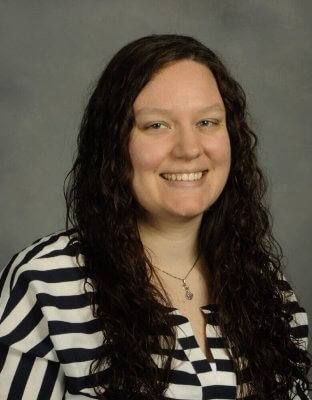 Assistant Professor of Pharmacy Practice Kacey Carroll, Pharm.D., CGP, was one of four pharmacists nationwide selected to participate in a Parkinson’s Disease Pharmacotherapy Traineeship offered earlier this year through the American Society of Consultant Pharmacists (ASCP) Foundation.
Assistant Professor of Pharmacy Practice Kacey Carroll, Pharm.D., CGP, was one of four pharmacists nationwide selected to participate in a Parkinson’s Disease Pharmacotherapy Traineeship offered earlier this year through the American Society of Consultant Pharmacists (ASCP) Foundation.
“I was very honored to be among the four chosen,” said Dr. Carroll. “The group of pharmacists that I attended the the traineeship with were fantastic — we all represented different aspects of pharmacy and brought a different experience level, and it was great to learn not only from those leading the traineeship but from each other’s experiences as well.”
Conducted at the Parkinson’s Disease and Movement Disorders Center at the Northwestern University Feinberg School of Medicine in Chicago, Illinois, the traineeship focused on Parkinson’s disease, although other movement disorders and conditions were also studied.
“I am a geriatric pharmacist by training and am always interested in learning more about geriatric medicine and disease states,” said Carroll. “I also find Parkinson’s to be a very medically interesting disease state because it is one where the patient takes a medication, and within 20 minutes can see such a vast improvement in their symptoms. There are very few instances in health care where a patient’s quality of life can be so quickly altered.”
During the traineeship, Carroll saw many different aspects of Parkinson’s care, including medication management, occupational therapy and physical therapy care, clinical trials, and how social workers and nurses care for patients and families. Each clinic patient was unique; the variety in symptoms she saw helped her better understand the nuances of treatment.
“Before I left for the traineeship I would have said that treating the motor (movement) symptoms of Parkinson’s would have been my main priority,” said Carroll. “However, there is so much more to take into account that affects patients every day, including sleep issues, depression, hallucinations, memory, saliva overproduction, etcetera. These things must be a focus of health care providers as well, and they’re definitely something I will teach to my students.”
Carroll has already altered and improved what she teaches to the university’s physician assistant students, and she will do so for the pharmacy students she teaches in the spring 2016 semester.
“Anytime you can bring in practical application, I think the students benefit and I will be able to draw on my experiences to explain the approach to treatment.”




